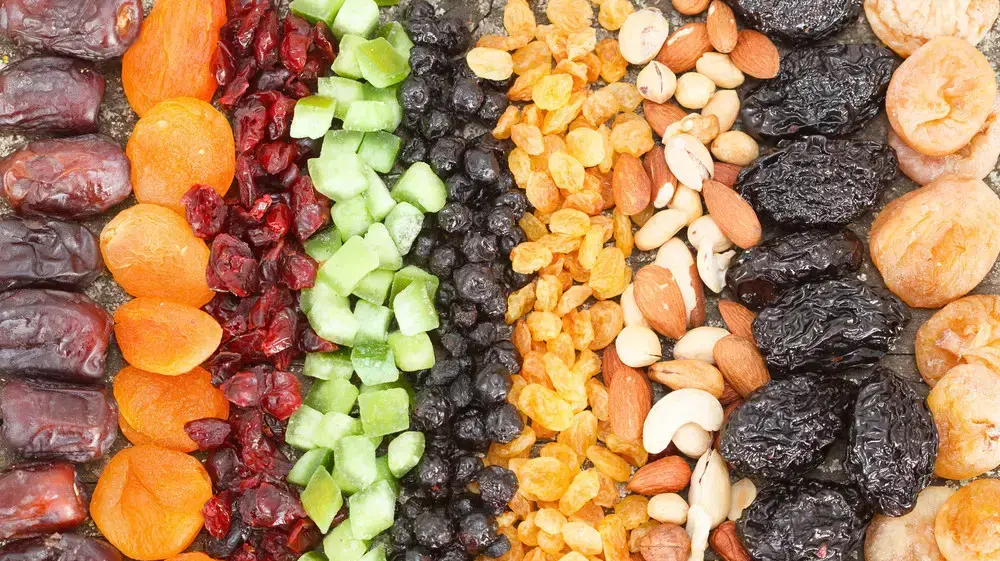The oil is already inside.
Dried crumb/ShutterStock
The drying process of fruits makes it possible to extend their shelf life, and concentrates the components of the fruit while preserving most of its nutritional benefits and even their concentration.
A banana, for example, is very rich in magnesium, and after drying it will contain much more magnesium in the portion of the fruit eaten.
In addition, the dried fruit can be eaten up to several months after picking, a significant figure especially for fruits such as apricots, whose ripening season is very short - only 5 days.
For thousands of years, the drying process has been done traditionally: the fruits are sliced, nets are put on them to prevent pests, and they are left to dry in the sun.
The modern process, on the other hand, is carried out in ovens: the fruits are placed in molds and put into controlled drying.
But if you buy the usual dried fruits, you will get a variety of chemicals with the fruit, up to substances derived from petroleum.
Get a detailed list:
1. Sulfites (sulphur dioxide) as a preservative
The dried fruit is very rich in sugars, and therefore constitutes a substrate for the growth of fungi and molds.
To prevent infections and extend shelf life, in the conventional industry the fruits are dipped in a solution of a strong preservative called sulfite.
The immersion delays the browning processes of the fruit and it keeps its original color.
In the conventional industry, glazing agents are used, which are synthetic food additives produced from components derived from petroleum, which are used to polish the outer surface of the fruit
It is important to know that there are people who are allergic to sulfites and therefore must not consume dried fruits at all.
Many of the dried fruits are sold in bulk, without packaging and without labeling, and therefore can pose a danger to those who are allergic.
In organic dried fruits, on the other hand, the use of sulfites is prohibited, and therefore even when they are sold in bulk, they are safe to eat.
More in Walla!
Virtual reality therapy: a treatment for coping with anxiety
In collaboration with zap doctors
2. Synthetic food colors
During the drying process the color of the fruit changes.
Conventional dried fruit manufacturers usually add synthetic food coloring to maintain the attractive color of the fruit.
Food dyes are allergenic and children with ADHD are also sensitive to them: for them, exposure to synthetic food dyes is particularly dangerous because it may cause hyperactive reactions to worsen.
The addition of synthetic food colors is prohibited in organic dried fruits.
3. Glazing materials with petroleum components
In the conventional industry there is the use of glazing agents which are synthetic food additives produced from ingredients derived from petroleum, which are used to polish the outer surface of the fruit.
These substances are prohibited in the organic fruit, and the natural glazes allowed are waxes such as beeswax or carnauba (natural wax from the palm tree).
Dried pineapple.
The food coloring will not allow the color to fade/ShutterStock
4. Pesticide residues
It is known that conventional fruits, even if washed and cleaned before the drying process, will still contain a certain amount of pesticides.
But the concentration process concentrates up to 5 times the same pesticides.
Organic dried fruits are free of any pesticides and therefore even after concentration they will remain free of them.
In the latest report of the Ministry of Agriculture on pesticide residues in fruits and vegetables, it was found that grapes have the most spraying in Israel, therefore even raisins, which are dried grapes, which are not organic, may contain a high content of pesticides.
In addition, it should be taken into account that due to the ban on the use of sulfites to preserve the fruit, or synthetic food colors - the organic dried fruits may contain a slightly different color or tone than the normal dried fruit.
For example, the orange organic apricot will have a shade that is more inclined to brown.
In conclusion, the consumption of the organic dried fruit guarantees the non-use of substances that may cause health damage and does not contain pesticide residues.
It should be noted that the most common dried fruit in the organic market is the organic date, and there are currently about 57 organic date growers in Israel, mainly in the Arava and the Bekaa.
Tali Brenner is the coordinator of the industry and food processing sector at Tov Sheda, the organization for organic agriculture in Israel
More on the same topic:
Dried Fruit
Tu Bishvat
organic

